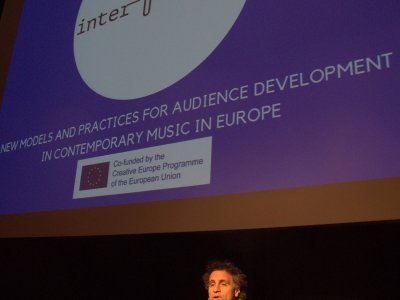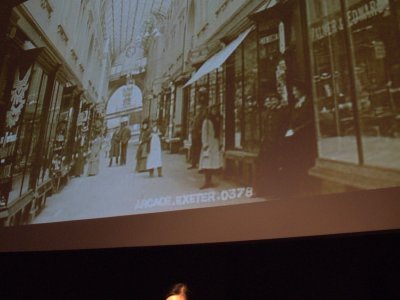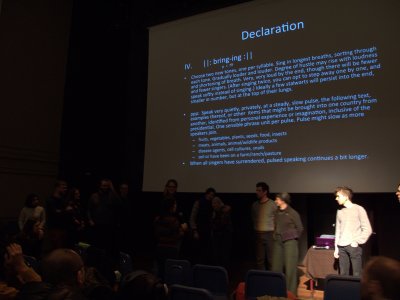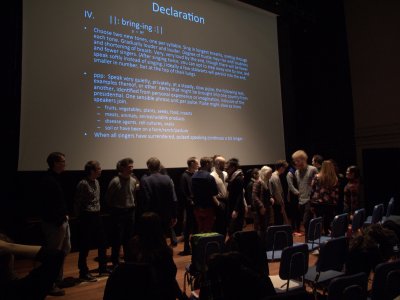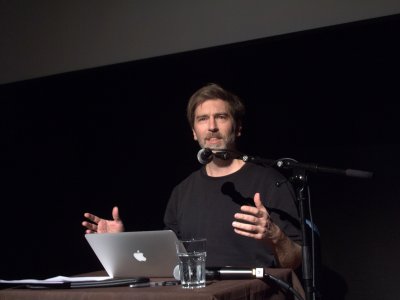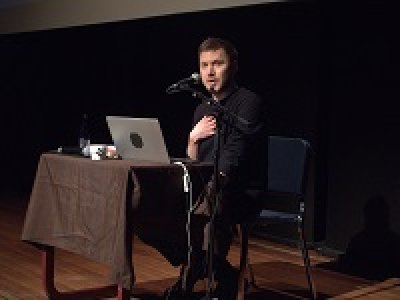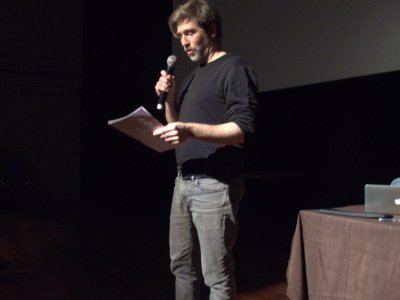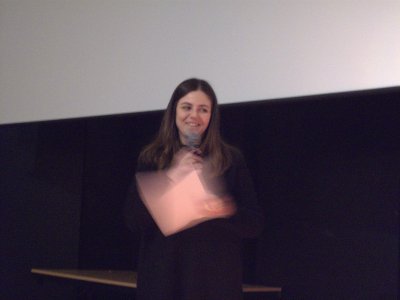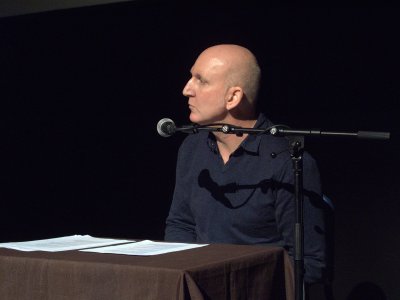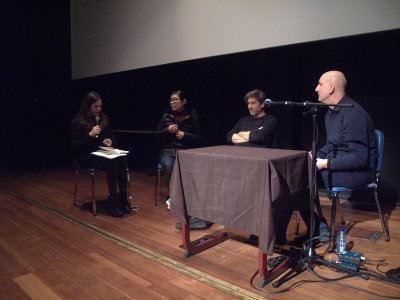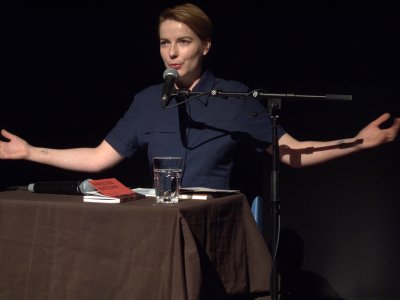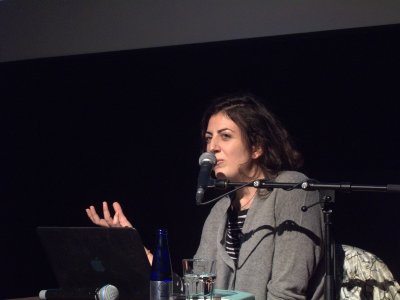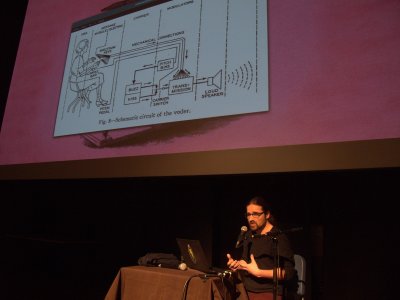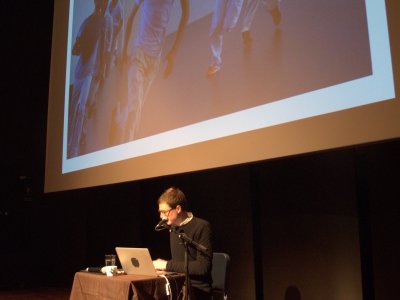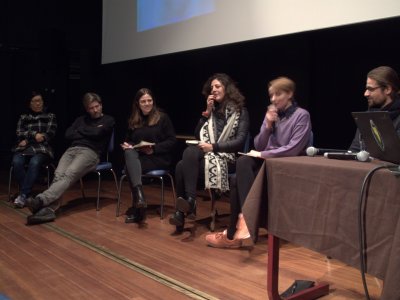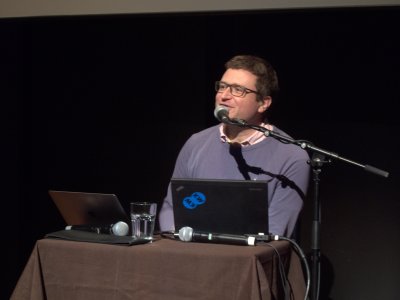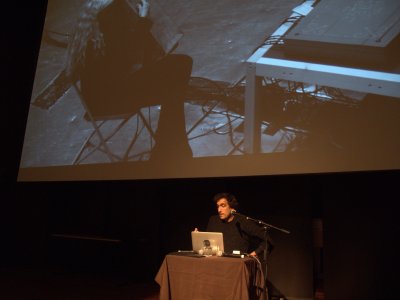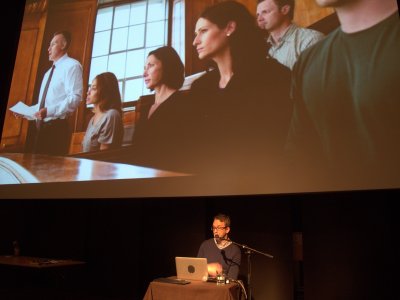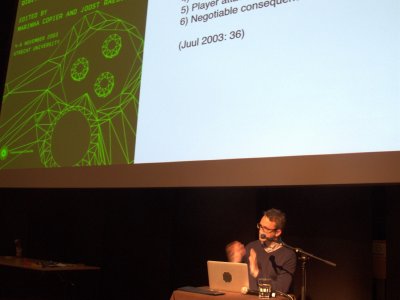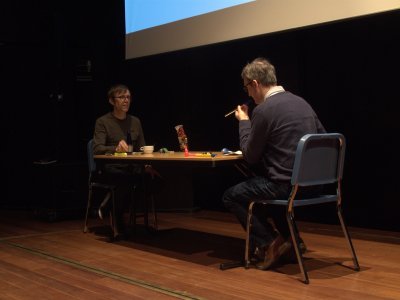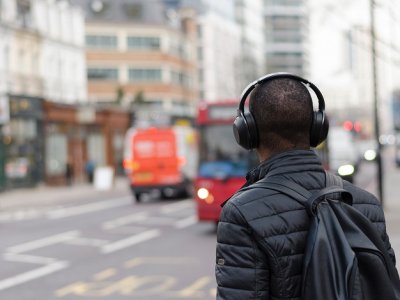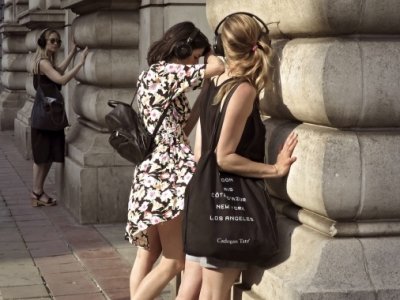Two days of conference and three days of workshops presented and unpacked the shapes and possibilities of participatory sound art and music practices today. As an inherently relational phenomenon, sound has a privileged set of possibilities within so-called social practice. In or outside of musical structures, sound vibrates against the distinction between producer and consumer, between spaces of reception and spaces of action, between abstract and applied art. It exists in the necessarily public space between us.
By acting in such a way, sound and music open themselves up to a wide range of ethical and political questions: who speaks? in what form? to whom? on behalf of whom? who listens? who has authorship and who is paid?
The conference brought together practitioners active in the fields of music, sound, visual art, radio, theory, and activism in order to debate and carve out sound’s stake in the political.
In addition to the symposium, three days of workshops accompanied the event, alongside an open forum where students and other participants could present their own work and get feedback. Talks and workshops were implemented in English.
WHO : Bill Dietz, Tarek Atoui, James Saunders, Tim Parkinson, Carolyn Chen, David Helbich, Edyta Jarzab, Anna Raimondo, Jaume Ferrete, Brandon LaBelle, Care of Editions / Gerhard Schultz, Manuela Naveau, Frederik Le Roy
WHERE : Symposium on 26-27 February 2018 in KASK Miry Concert Hall (Ghent) / Workshops and Open Forum (registration needed) on 28 February & 1-3 March at Q-O2 and Ictus (Brussels).
organised by : Q-O2 workspace & Ictus, in partnership with Kask & Conservatorium School of Arts Gent, in the framework of the Interfaces project, co-funded by the Creative Europe Programme of the European Union.
Download full program as pdf
CONFERENCE SCHEDULE (venue: KASK – Miry Concert Hall, Ghent)
DAY 1 – Monday, February 26
Moderator: Leonie Persyn
10h – 13h: networks and institutions:
Care of Editions – Performative Distribution
This talk looks at a history of performative distribution in music composition and performance as a way to establish a lineage for the experimental record label Care Of Editions. By looking, for example at instruction poems written on envelopes (which serve as scores for unsuspecting postal workers) by Mallarmé and their relation to digital means of distribution, the presentation aims to investigate how the distribution of music, not only its production, can be a field for participatory involvement. Such strategies aim to conflate the role of performer, audience, and interpreter by injecting the mechanics of playback or content delivery with a poetic meandering.
Manuela Naveau – CROWD and ART. Art and participation on the internet
What art can result from the involvement of authors to a networked reality, and what does this have to do with knowledge or non-knowledge? Working at the nexus of art theory, cultural studies, media studies and the history of technology, Manuela Naveau scrutinises the nature of participative art on the internet. In so doing, she provides an introduction to the world of computer-aided participation models and elaborates on terms like the masses and the crowd, the audience, etc. Nave focusses particularly on the various forms of unknowing and involuntary participation, urging a much-needed discussion about how to develop effective design options in a time of rapidly progressing digitisation and transformation processes.
Frederik Le Roy – The Museum Echoes. Contemporary Choreography and the Exhibition of Spectatorship
The background of this presentation is the current institutional desire in the contemporary visual arts world to document, present, and ‚collect works of live art (e.g. performance and sound art, theatre and dance) in the museum. This transposition of works of performance from the ‚black box‚of theatre to the white cube‚of the exhibition space questions the historically established temporal and spatial preconditions of the museum experience (e.g. its focus on material objects instead of transitory events). However, it also produces an interaction between the performing arts‚ and the visual arts different codes, rituals, and modes of spectatorship. Starting from the choreographic exhibition Work/Travail/Arbeid (Rosas) and other examples, we explore what forms of spectatorship these projects engender, and ‚what this might tell us about the contemporary dramaturgies of attention and participation that emerge when live art enters the echoey architectural and institutional context of the museum space.
14h – 17h: composition and performance
Bill Dietz – Feelings Are Alternative Facts
Throughout recent Euro-American election cycles, much has been written against the “irrationality” and “emotionality” of ascendant neo-fascist political parties and candidates. If we could only get back to rational-critical discursivity! Could music as a technique for orienting asignifying processes – as a practice of nonverbal organisation, play a role in articulating an antifascist politics of affect? Drawing on historical examples and cases from his own recent work, Dietz listens closely for the traces of an assembly imbued with “musical” intelligence.
Tarek Atoui– Understanding Contemporary Music
Tarek Atoui presents his understanding of contemporary music and the act of composition in the heritage of Cage, Cardew and Pauline Oliveros. He then takes examples from his project WITHIN, a project which departs from Deaf Culture to find new ideas for building instruments, composing, and performing to show how he composes with research, education, performance and production as much as he does with people, instruments, sounds and situations.
James Saunders – Group behaviours as music
In daily life, large groups of people regularly co-ordinate their actions – voting, leaving a building, selecting a restaurant, etc. As individuals we read each other’s movements, facial expressions, and utterances in order to negotiate our encounters with the people we meet. These behaviours govern our relationships with others and our engagement with the world. As musicians, we form complex interpersonal relationships both with each other when playing together, and with an audience. The social behaviour of groups can be used as a means to articulate musical structures and processes. Recent work using recorded instructions, performance practice training, and cueing networks suggest approaches to group behaviours that rely on different frameworks to construct relations between performers. At the end of this lecture, James Saunders and Tim Parkinson present a small intervention.
18:00: Performance: Tim Parkinson – Time with people
Using absurdity, humour, and non-narrativity to redefine notions of music and memory, Time With People is an hour-long music and theatre work by British composer Tim Parkinson (born 1973). As Parkinson writes, the opera in seven scenes for ten people and assorted objects “redefines fundamentals of opera from its 16th century origins… reconceived from elements of 21st century post-historical culture.”
Time With People (2013) is not an opera in the traditional sense. There are no characters, costumes, or even orchestral instruments. Instead, the stage is set with trash and other assorted objects. The soloists and chorus speak, dance, chant, and drum. And the only “classical” music comes from a recording.
Alternately funny, playful, perplexing, and sad, the work challenges audiences to reconsider their preconceived notions of the nature of music. Writing about the world-premiere performance, Lawrence Dunn remarked “This is a world in which music is a kind of memory—something that must be reconstructed from the ground up, and afterwards returned to the same ground.”
The piece hearkens back to the traditional sense of an opera as a collection of works, yet upends tradition by largely removing music and the orchestra, leaving behind only fragments, both musical and literal: recorded excerpts of Handel and Rossini begin and end the work, while a trash-strewn set serves as an orchestra of found objects as the performers wade through it.
DAY 2 – Tuesday, February 27
Moderator: Chiara Nuzzi
10h – 13h: the public and the social
Carolyn Chen – Music in Social Spaces
In social spaces outside of the concert hall, physically mobile performing bodies lend themselves to social fluidity, reconfiguring audience-performer roles, and highlighting spatially designed structures of power. Carolyn Chen presents a few pieces for public spaces open to participants regardless of musical training, and discuss listening dynamics particular to their social circumstances. Examples include pieces for supermarket, human wind-chimes, rolling marbles, and a ballet for small blinking lights. In an art world context, historical precedents include Fluxus, game pieces by Christian Wolff and John Zorn, the Situationist dérive, Augosto Boal‚’s Theater of the Oppressed, and sound walks by Janet Cardiff, Christina Kubisch, Ben Carson, and Max Neuhaus. Other influences include children’s games and the Taoist nature philosophy of becoming one with the environment. She addresses the aesthetics of music in social spaces in relation to these influences as well as concepts of competition, leaderless resistance, disruption, and cooperation.
David Helbich – No Music – earpieces: Listening to our own hearing
Helbich’s collection of earpieces‚tries through different means and set ups to trigger a musical experience without any music being played back. The key is a guided self-performance of the audience, an intro-active situation, that at the same time gives back the agency of the event to the individual audience members. The set-ups vary from public audience-rehearsals and audio guides to simple DIY-notations in the form of score-books and posters. For this occasion, Helbich presents a mix of thoughts and exercises.
Brandon LaBelle – Poor Acoustics
Extending from notions of precarity, Poor Acoustics, considers how sound and listening weaken us, making us vulnerable to the intensities of worldly contact and each other. By reflecting upon particular experiences of sound and listening, the issue of participation is being put into question, drawing attention to interruption, silence, and overspeaking as indicative of a sonic relationality. Accordingly, weakness is posed as a state by which to foster new formations of social solidarity and self-organisation, where participation requires if not demands a poor acoustics.
14h – 17h: activism and politics
Edyta Jarzab– Voice of Resistance
Is the possibility of amplifying the voice a dispensation reserved explicitly for ruling powers? And how can singing and shouting be an expression of consensus and audible resistance against an amplified voice of authority? Based on her research into the sonic-space of protest in Poland over the past two years – a field in which she is highly active – Jarzab looks at the various vocal strategies used in the grassroots political actions in which she has been involved – a practice of gathering voices and exercising loud unison.
Anna Raimondo – Gender perspectives and urban geography
Nourished by her recent theoretical and artistic research, Raimondo attempts to remap and reflect on cities through a perspective of gender. The presentation focusses particularly on the city of Brussels, by showing the results of a collective, workshop-based, urban drive by women. In this workshop, the question evolved: what is a women friendly place within urban space? Challenging the assumed neutrality of ‘the public sphere’, Raimondo’s presentation uses recordings and observations from this workshop as a way to talk about how it feels to be a woman in an urban context, and what possibilities may be present to provoke and activate public space.
Jaume Ferrete,– Your Father Is Speaking with My Father’s Voice
Synthetic voices work as a representation of our own voices and, consequently, as a performing index of those techniques and discourses that our voices are practice and product of. Yet synthetic voices are not solely representations of our voices; they equally are our voices. As they increasingly partake in similar genealogies of repetition, both the voices we understand as our own and those of the devices we built seem to be reproducing or quoting one another. It is not entirely clear who is speaking.
Your Father Is Speaking with My Father’s Voice takes on a possible political history of synthetic voices, starting with an encounter between the daughter of Stephen Hawking, and the daughter of Dennis Klatt, the engineer who, using recordings of his own voice, developed the voice that Hawking himself uses.
WORKSHOP SCHEDULE
Monday 19 – Friday 23 February
Tim Parkinson – Time with people
(venue tbc, with five-day commitment)
Using absurdity, humour, and non-narrativity to redefine notions of music and memory, Time With People (2013) is an hour-long music and theatre work by British composer Tim Parkinson (1973). As Parkinson writes, the opera in seven scenes for ten people and assorted objects “redefines fundamentals of opera from its 16th century origins… reconceived from elements of 21st century post-historical culture.” Time With People is not an opera in the traditional sense. There are no characters, costumes, or even orchestral instruments. The piece hearkens back to the traditional sense of an opera as a collection of works, yet upends tradition by largely removing music and the orchestra, leaving behind only fragments, both musical and literal: recorded excerpts of Handel and Rossini begin and end the work, while a trash-strewn set serves as an orchestra of found objects as the performers wade through it.
Sunday 25 February 10h – 17h
Anna Raimondo – New Boundaries of the Wellness of the Vaginal Ecosystem
(venue Q-O2, Brussels – 8 participants)
The workshop consists of collective walks and deep listening in the city of Brussels. Each walk begins from a place that is significant to one participant and developed into a joint dérive by collectively following the hearing of whoever had proposed the walk‚as beginning point. During these walks, each participant is invited to take personal notes (recordings, visual notes, or writing) about her presence in each specific context in that moment. Special attention is being payed to the experience of listening in these places. Eventually, shared material from the workshop can be brought together into a radio show or collective audio(visual) work.
Wednesday 28 February 10h – 17h
Bill Dietz – L’école de la claque
(La Monnaie De Munt ateliers, Brussels – 10 participants)
That the modern European concert format and its concertante listening are exemplary instances of the historical “public sphere” is a foundational assumption tacitly accompanying much “critical” music production. If, however, the public sphere is retroactively understood as a universalising projection of an exclusive cadre, where does this leave contemporary efforts to think and to counter the algorithmic seeding of publicness that characterises recent political history? Can we imagine non-nostalgic forms of convocation? Following Dietz’ eponymously titled work for the 2017 Donaueschinger Musiktage and its accompanying publication, the workshop invites participants to boo and cheer their way through a history of concert publicness.
Manuela Naveau – Knowledge or Non-knowledge
(venue Q-O2, Brussels – 12 participants)
The internet not only makes it necessary for us to redefine terms such as the masses and the individual, it also focuses attention on forms of participation that occur involuntarily and unconsciously. In the workshop, we begin by looking into case studies about sonic participation, after which we collectively work, develop, and present our thoughts and efforts to investigate the subject of participation in a way that is grounded in our networked reality – as a means of navigating a course between romanticised conceptions like emancipation and empowerment, and dystopian connotations like surveillance, control, and appropriation.
Thursday 1 March 10h – 17h
Carolyn Chen– Music for bodies
(venue Ictus, Brussels – 12 participants)
Games of listening, moving, listening through moving – requiring no particular training or instruments. Warm-up exercises drawn from aikido, tai chi, contact improvisation, Augusto Boal’s Theater of the Oppressed. Tuning meditation, lip-reading confessions, flocking and muting, and hacked games of three-legged races, wheelbarrows, tag, human pyramids, steering and directing the bodies of others. Cooperation, competition, and contact. Discuss how listening, movement, and sound-making interact in various contexts and varying degrees of proximity, and workshop pieces by the group.
Edyta Jarzab– Joining the Resistance
(venue Q-O2, Brussels – 20 participants)
In this workshop, Jarzab shares a set of exercise she has developed and used in Warsaw before and during street protests, that aim to amplify the importance and power of the voice as a tool within political activism. Participants experience and explore their full voice in space, in relation to others. The workshop looks for a possible balance between sounding and listening by focusing on energetic processes, play, improvisation, and non-hierarchic synchronicity.
Friday 2 March 10h – 17h
David Helbich, – “Audience, listeners, spectators, visitors, guests: how dare you show up!” – audience observations & visitors scores
(venue Ictus, Brussels – 8 participants)
Audiences are performative, not only in an intellectual sense; by following or watching a work of art – but also physically. Their bodies have an influence on the experience of a piece as well as on the work itself. How can this performative quality of the audience become a part of a work’s dramaturgy? How can artists play with this? In this work-meeting, together with David Helbich, the participants examine and search for concepts of intervention into the space of the audience with the aim to try out several option in the second half of the day.
Saturday 3 March 10h – 17h
OPEN FORUM (venue Q-O2, Brussels)
An OPEN FORUM on the last day offered all players active in the field of sound and/or participation the opportunity to present their projects.
Will you attend the symposium? Let us know here if you can come.
CONFERENCE
February 26-27, 2018
in Kask Miry-zaal, Ghent
WORKSHOPS
February 28, March 1 and 2, 2018
in Brussels, at Q-O2 and Ictus
ABOUT WORKSHOP REGISTRATION
Registration for the workshops is required!
Send an e-mail with the workshop(s) of your choice to eveline@q-o2.be
to book your place. The reply you will receive contains all the details for bank transfer to confirm your participation.
BEST-PRACTICES-ROOM
in Kask (Ghent) open during the days of the conference
FEE:
symposium: free/workshops 20€ each, on registration.
Open forum: free.
Proposals by February 1st.
In partnership with Kask & Consevatorium School of Arts Gent

